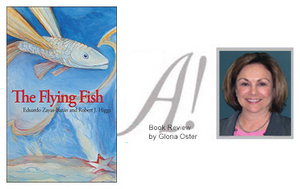

The Flying Fish combines page-turning suspense with detailed accounts of historical events. The authors, Eduardo Zayas-Bazan and Robert (Jack) Higgs, both former East Tennessee State University professors, bring a wealth of talent and experience to this work.
The large-finned fish devoured its catch in mid-air, and the unexpected scene was over within a second....Luis noticed the shape of the marlin as it went sailing through the air -- the big, beautiful, sun-lit, sea-drenched marlin reminded him of Cuba! Cuba, long and slim, rose from the blue-green sea, and, like the marlin, her oligarchy fed on smaller fry....(The Flying Fish, p. 39)
Thus, the main character of The Flying Fish, the young Luis Recio, has an epiphany that expresses his passionate love of Cuba and his emerging awareness of the country's need for social justice and reform before the Cuban Revolution's "triumph" in 1959.
Recio's youthful idealism and his earnest nature propel him into the heart of the Cuban Revolution as a guerilla in the Sierra Maestra, fighting right by Castro's side. Recio later becomes an assistant minister of justice in the new government. Later still, his love for Cuba directs him to resist Castro's brand of "justice" to become a major player in the attempt to overthrow the dictatorship. The title not only describes Cuba but also foreshadows Recio's role as a frogman in the Bay of Pigs invasion during the Kennedy administration.
For the 21st century reader, Recio's innocence and his growing disillusionment with Castro provide a sad irony stemming from the reader's knowing the eventual outcome of Cuba's revolution and subsequent history. Such knowledge does not diminish the satisfaction of experiencing the story from the perspective of Recio, for the telling of the tale, the details and events well-ordered, provides the reason to continue reading.
A slice of time preserved by a novelist's license to tell a good story and by a historian's mandate to relate details as accurately as possible, The Flying Fish vividly presents imagery that evokes the daily lives of Cubans from different social classes. The sights and smells of Camaguey, where the Recios' home and plantation are located, and Havana, where roast pork, black beans and rice, Cuba libres, and parties abound, are a backdrop for the evolving Recio.
The early part of the novel depicting Recio's privileged coming-of-age on his family's sugar cane plantation brims with proud details of his family's ancestry, the traditions present in Cuban society, and Recio's own deepening sense of responsibility to bring democracy to Cuba's people by defeating the government of Batista. Not surprisingly, as a young man, Recio develops a heightened attraction for several women of various ages. One such encounter prompts his father to send him to an American military school where he draws many contrasts between Cuban and American life, returning to Cuba a well-educated man, filled with notions of military valor.
History is very much a part of the telling of Recio's personal story. A more mature Recio volunteers for Castro's guerilla army, fighting alongside Castro, "The Horse." Recio's perspective on the dictator and his habits is deliciously interesting, similar to reading a snippet of a grocery-store tabloid about a reclusive celebrity. Later, as Recio realizes the extent of Castro's desire for power and his capacity for cruelty, Recio prepares to help overthrow Castro's government, even as he performs the duties of assistant minister of justice.
The novel re-creates Castro's triumphant entry into Havana on January 8, 1959, and his gradual overtaking control of Cuban life. Recio's motivation for training and participating as a frogman in the Bay of Pigs Invasion stems from all he has witnessed in the corrupt governments of Cuba and from his genuine love of Cuba and her people. Recio is captured after the failed invasion and suffers much at the hands of his captors. Suffice it to say that this section of the novel is riveting and graphic. These selected representative details and others like them engage readers by providing insight into important historical events for Cubans and Americans by way of a patriot's story.
About the Authors: Zayas-Bazan, a retired Spanish professor, was a frogman in the Bay of Pigs Invasion who was captured and ransomed to the American government. His experiences provide the lifeblood of the novel. Higgs, a retired English professor, has written numerous articles and books. His regard for language and a fascinating story provide the solid framework upon which the novel is developed. Romance, war, coming-of-age, actual history, and celebrity trivia -- all are integral parts of The Flying Fish. Appropriately, these two talented professors merge their respective gifts to create a remarkable work of historical fiction.
Obtain a copy by accessing either of these websites: www.eduardozayas-bazan.com or www.trafford.com/08-1021.
Meet the authors Monday, Sept. 28 at 7 p.m. at the Bristol Public Library's J. Henry Kegley Meeting Room.
About the Reviewer: Gloria Oster teaches in the School of Education at King College.